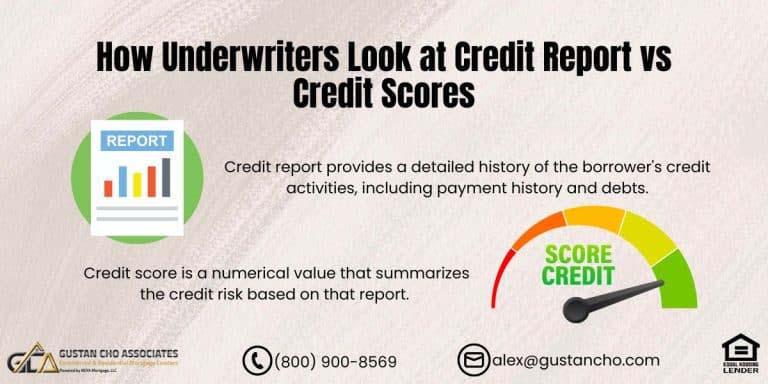This guide covers the importance of credit reports in the mortgage application process. Our society is credit-driven. Almost every aspect in the financial world is based on a borrower’s credit score and credit report, especially in mortgage lending. Credit and income are the two most important factors to a lender. However, just because a borrower meets the minimum credit score requirement does not necessarily mean they automatically qualify for a mortgage loan. Every mortgage loan program has a minimum credit score requirement. This article will discuss the Importance Of Credit Reports In the Mortgage Application Process.
The Importance of Credit Reports in the Mortgage Process
If you consider buying a home, you will soon learn that the road to homeownership is lined with numbers. One of the most important numbers is hidden beneath another: your credit report. Think of the report as a detailed story of how you have handled borrowed money. Because lenders read this story closely, it decides whether you get approved for a mortgage, how high your interest rate will be, and what other costs you might face. This article will break down every piece of that story, show how it shapes the mortgage process, and give you simple steps to prepare your credit for the big application day.
Your Credit Report Can Make or Break Your Mortgage Approval
Lenders use it to determine your eligibility, interest rate, and loan terms.
The Importance of Credit Reports: What Is a Credit Report?
At its core, a credit report is a record that shows each time you borrowed money or opened an account, and how responsible you were after that. Three main companies, called credit bureaus, put this record together: Equifax, Experian, and TransUnion. The report lists every credit account you have ever opened, notes whether you paid bills on time, adds up what you still owe, and even points out serious setbacks like bankruptcies. When a lender sits down to review your mortgage application, this report is one of the first places they look to decide if you will repay them on schedule.
Key Components of a Credit Report
The Importance of Credit Reports: How Does Credit Work
- Personal Information—Basic facts like your name, address, and Social Security number are at the top.
- Credit Accounts- A summary of credit cards, loans, and other lines of credit follows, showing how much money you owe and whether payments arrived early, on time, or late.
The Importance of Credit Reports: What Your Credit Report Shows
- Credit Inquiries: This section lists everyone who reviewed your credit file.
- It has hard pulls, like when you apply for a mortgage, and soft pulls, like a free credit check.
- Public Records: Here you’ll see major legal marks, such as bankruptcies, foreclosures, or unpaid tax liens, which can weigh down your score.
- Credit Score: Your actual number sits separate from the report, but it gets whipped up using the info inside—that score, whether FICO or Vantage, nearly always sways a lender’s mortgage decision.
The Importance of Credit Reports and Why it Matters in the Mortgage Process
Mortgage lenders don’t guess about your money habits. They read your credit report and form a judgment. Understanding how they read that file can help you get a better deal, or any deal at all. Here are the key roles the report plays:
The Importance of Credit Reports Because it Determines Loan Approval
- Alongside income and assets, your report decides if you walk away with signed papers or a “try again” note.
- A long history of timely bills paints you as a safe bet, while missed payments and collections scream risk.
- Even solid income may not save the file from rejection when those red flags appear.
Credit Scores Shape Mortgage Costs
Influence Interest Rates
- Your credit score, lifted straight from your credit report, sets the interest rate you get on a mortgage.
- Better scores usually snag lower rates, often saving you thousands over the years you own the house.
- For example, a borrower with a 760 FICO might lock in a 30-year fixed loan at around 6.5%.
- Yet, a person with a 620 score could be quoted 7.5% or higher, pushing the monthly payment up by hundreds.
Impacts Loan Terms and Conditions
Interest is only one piece. Your report also steers things like how much money you must put down or whether you’ll pay monthly private mortgage insurance. People with lower scores may face larger down-payment demands and must carry PMI, a monthly fee that shields lenders if the loan goes bad.
Affects Debt-to-Income Ratio (DTI)
When lenders size you up, they look closely at your debt-to-income ratio, or DTI, which divides your monthly bills by paycheck. Your credit report lists those bills, which clearly show what you owe. A high DTI, often seen as anything over 43 percent, can dim your odds of getting approved for the new mortgage you want.
Flags: Potential Red Flags
Spotting mistakes or signs of fraud on your credit report can mean the difference between an easy mortgage approval and a major headache. An unpaid medical bill that never showed up, or a wrongly marked late payment, might knock your score down just enough to cost you a better interest rate. By checking your report regularly, you can fix these problems long before a lender sees them.
How Lenders Use Your Credit Report
When lenders pull your file, they don’t look at just one bureau. Instead, they order a tri-merge report, which blends records from Experian, TransUnion, and Equifax into a single document. After that, they grab the middle score, or the lower one if they see only two, to guide their decision. Here’s the routine step-by-step:
- Pre-Approval: First, during pre-approval, the lender uses the score to guess how much money you can borrow and what interest rate you’ll see.
- Underwriting: Later, a second look helps them double-check your income and debts and determine whether anything still mismatches.
- Final Approval: Just before closing, they pull the report one last time to ensure no new loans or surprises have occurred since you started the process.
How to Get Your Credit Ready for a Mortgage
Your credit report can greatly affect whether lenders say yes to your mortgage. Try these simple steps to polish your credit before you apply:
Check Your Credit Report Early
Start by getting free copies of your credit reports from Equifax, Experian, and TransUnion at AnnualCreditReport.com. Look carefully for incorrect balances, duplicate accounts, or unfamiliar inquiries. If you spot anything off, dispute it immediately; fixes usually take 30 to 60 days.
Boost Your Credit Score
- Pay Down Debt: Bring credit card balances down so your overall use stays under 30 percent.
- Make Timely Payments: Since payment history makes up 35 percent of your FICO score, always pay bills on time.
- Avoid New Credit: Wait to open new cards or make big purchases, because fresh accounts create hard inquiries that can drag your score down.
- Clean Up Negative Marks: If your report still shows late payments or collections, take action.
- Pay off outstanding debts, set up a plan you can stick with, or let older items age off; most bad marks drop off after seven years.
- Keep Your Debt-to-Income Ratio Low: One of the easiest ways to boost your mortgage application is to lower your debt-to-income (DTI) ratio.
- Focus on paying down current bills instead of picking up new loans, especially while your mortgage is in process.
Get Help from a Mortgage Pro
A good loan officer or mortgage broker can pull your credit report, spot weak spots, and tell you exactly what you need to fix. If your score is lower, they’ll also match you to the best loan option, like an FHA program.
Common Credit Report Blunders to Watch Out For
- Ignoring Mistakes: Skipping credit checks lets errors hide and damage your mortgage chances.
- Multiple Applications at Once: Nailing a bunch of loan apps in a week triggers several hard inquiries, which drop your score.
- Closing Old Accounts: Shuttering unused cards shrinks your credit age and raises your utilization, two strikes against your score.
- Late Payments: One missed payment can hit your score hard, so set up autopay alerts to stay on time.
How Mortgages Treat Your Credit
- Conventional Loans: They usually require at least a 620 score. Rates improve once you climb past 740.
- FHA Loans accept scores as low as 580, and even 500 if you put down 10%.
- VA Loans technically have no set cut-off, yet lenders usually look for around 620 or better.
- USDA Loans work the same way, letting families in rural areas borrow with flexible credit, though 640 is the sweet spot many lenders like.
- Always ask your lender what standard they use.
The Long-Term Impact of a Good Credit Report.
A healthy credit report does more than get you a mortgage; it steers your financial future. Strong scores can trim your interest rate, lower your monthly bill, and change loan details, so you spend less over the decades. Keep those good habits after closing; you might also snag an easy refinance or kinder deals on the next big purchase. Your credit report is at the heart of the mortgage game, shaping everything from whether you get approved to the monthly payment you see. When you know that, keep an eye on your scores and tackle small fixes over time, you set the stage for a faster and cheaper home-buying trip. To begin the credit clean-up now, talk to a mortgage pro about your next move, and watch how a healthy report brings that dream front door closer.
Call to Action
Excited to kick off your mortgage journey? Grab a free copy of your credit reports now at AnnualCreditReport.com, then reach out to a lender who can walk you through options. If you found this guide helpful, pass it to a friend planning to buy a home, and drop a comment below about the steps you’re taking to boost your credit for the big application!
Want to Buy a Home? Start With Your Credit Report
Understanding your credit is the first step toward qualifying for the best mortgage.
The Importance of Credit Reports in the Mortgage Process
If you consider buying a home, you will soon learn that the road to homeownership is lined with numbers. One of the most important numbers is hidden beneath another: your credit report. Think of the report as a detailed story of how you have handled borrowed money. Because lenders read this story closely, it decides whether you get approved for a mortgage, how high your interest rate will be, and what other costs you might face. In this article, we will break down every piece of that story, show you how it shapes the mortgage process, and give you simple steps to prepare your credit for the big application day.
What Is a Credit Report?
At its core, a credit report is a record that shows each time you borrowed money or opened an account, and how responsible you were after that. Three main companies, called credit bureaus, put this record together: Equifax, Experian, and TransUnion. The report lists every credit account you have ever opened, notes whether you paid bills on time, adds up what you still owe, and even points out serious setbacks like bankruptcies. When a lender sits down to review your mortgage application, this report is one of the first places they look to decide if you will repay them on schedule.
Key Components of a Credit Report
- Credit Works—Personal Information—Basic facts like your name, address, and Social Security number are at the top.
- Credit Accounts- A summary of credit cards, loans, and other lines of credit follows, showing how much money you owe and whether payments arrived early, on time, or late.
What Your Credit Report Shows
- Credit Inquiries: This section lists everyone who reviewed your credit file. It has hard pulls, like when you apply for a mortgage, and soft pulls, like a free credit check.
- Public Records: Here, you’ll see major legal marks, such as bankruptcies, foreclosures, or unpaid tax liens, all of which can weigh down your score.
- Credit Score: Your actual number sits separate from the report, but it gets whipped up using the info inside—that score, whether FICO or Vantage, nearly always sways a lender’s mortgage decision.
Why Credit Reports Matter in the Mortgage Process
Mortgage lenders don’t guess about your money habits; they read your credit report and form a judgment. Understanding how they read that file can help you get a better deal, or any deal at all. Here are the key roles the report plays:
Determines Loan Approval
Alongside income and assets, your report decides if you walk away with signed papers or a “try again” note. A long history of timely bills paints you as a safe bet, while missed payments and collections scream risk. Even solid income may not save the file from rejection when those red flags appear.
Credit Scores Shape Mortgage Costs
Influence Interest Rates
Your credit score, lifted straight from your credit report, sets the interest rate you get on a mortgage. Better scores usually snag lower rates, often saving you thousands over the years you own the house. For example, a borrower with a 760 FICO might lock in a 30-year fixed loan at around 6.5%. Yet, a person with a 620 score could be quoted 7.5% or higher, pushing the monthly payment up by hundreds.
Impacts Loan Terms and Conditions
Interest is only one piece. Your report also steers things like how much money you must put down or whether you’ll pay monthly private mortgage insurance. People with lower scores may face larger down-payment demands and must carry PMI, a monthly fee that shields lenders if the loan goes bad.
Affects Debt-to-Income Ratio (DTI)
When lenders size you up, they look closely at your debt-to-income ratio, or DTI, which divides your monthly bills by paycheck. Your credit report lists those bills, which clearly show what you owe. A high DTI, often seen as anything over 43 percent, can dim your odds of getting approved for the new mortgage you want.
Flags: Potential Red Flags
Spotting mistakes or signs of fraud on your credit report can mean the difference between an easy mortgage approval and a major headache. An unpaid medical bill that never showed up, or a wrongly marked late payment, might knock your score down just enough to cost you a better interest rate. By checking your report regularly, you can fix these problems long before a lender sees them.
How Lenders Use Your Credit Report
When lenders pull your file, they don’t look at just one bureau. Instead, they order a tri-merge report, which blends records from Experian, TransUnion, and Equifax into a single document. After that, they grab the middle score, or the lower one if they see only two, to guide their decision.
Here’s the routine step-by-step:
- Pre-Approval: First, during pre-approval, the lender uses the score to guess how much money you can borrow and what interest rate you’ll see.
- Underwriting: Later, a second look helps them double-check your income and debts and determine whether anything still mismatches.
- Final Approval: Just before closing, they pull the report one last time to ensure no new loans or surprises have occurred since you started the process.
How to Get Your Credit Ready for a Mortgage
- Your credit report can greatly affect whether lenders say yes to your mortgage.
- Try these simple steps to polish your credit before you apply:
Check Your Credit Report Early
- Start by getting free copies of your credit reports from Equifax, Experian, and TransUnion at AnnualCreditReport.com.
- Look carefully for incorrect balances, duplicate accounts, or unfamiliar inquiries.
- If you spot anything off, dispute it immediately; fixes usually take 30 to 60 days.
Boost Your Credit Score
- Pay Down Debt: Bring credit card balances down so your overall use stays under 30 percent.
- Make Timely Payments: Since payment history makes up 35 percent of your FICO score, always pay bills on time.
- Avoid New Credit: Wait to open new cards or make big purchases, because fresh accounts create hard inquiries that can drag your score down.
- Clean Up Negative Marks: Take action if your report still shows late payments or collections.
- Pay off outstanding debts: Set up a plan you can stick with, or let older items age off.
- Most bad marks drop off after seven years.
Keep Your Debt-to-Income Ratio Low
One of the easiest ways to boost your mortgage application is to lower your debt-to-income (DTI) ratio. Focus on paying down current bills instead of picking up new loans, especially while your mortgage is in process.
Get Help from a Mortgage Pro
A good loan officer or mortgage broker can pull your credit report, spot weak spots, and tell you exactly what you need to fix. If your score is lower, they’ll match you to the best loan option, like an FHA program.
Common Credit Report Blunders to Watch Out For
- Ignoring Mistakes: Skipping credit checks lets errors hide and damage your mortgage chances.
- Multiple Applications at Once: Nailing a bunch of loan apps in a week triggers several hard inquiries, which drop your score.
- Closing Old Accounts: Shuttering unused cards shrinks your credit age and raises your utilization, two strikes against your score.
- Late Payments: One missed payment can hit your score hard, so set up autopay alerts to stay on time.
How Mortgages Treat Your Credit
- Conventional Loans: Usually ask for at least a 620 score.
- Rates improve once you climb past 740.
- FHA Loans accept scores as low as 580, and even 500 if you put down 10%.
- VA Loans technically have no cut-off, yet lenders usually look for around 620 or better.
- USDA Loans work much the same way, letting families in rural areas borrow with flexible credit, though 640 is the sweet spot many lenders like.
- Always ask your lender what standard they use.
Don’t Let Credit Surprises Delay Your Loan
We’ll help you review, correct, and strengthen your credit before submitting your mortgage application.
The Long-Term Impact of a Good Credit Report
A healthy credit report does more than get you a mortgage; it steers your financial future. Strong scores can trim your interest rate, lower your monthly bill, and change loan details, so you spend less over the decades. Keep those good habits after closing; you might also snag an easy refinance or kinder deals on the next big purchase.
Your credit report is at the heart of the mortgage game, shaping everything from whether you get approved to the monthly payment you see. When you know that, keep an eye on your scores, and tackle small fixes over time, you set the stage for a faster and cheaper home-buying trip. To begin the credit clean-up now, talk to a mortgage pro about your next move, and watch how a healthy report brings that dream front door a little closer.
Call to Action
Excited to kick off your mortgage journey? Grab a free copy of your credit reports now at AnnualCreditReport.com, then reach out to a lender who can walk you through options. If you found this guide helpful, pass it to a friend planning to buy a home, and drop a comment below about the steps you’re taking to boost your credit for the big application!
Minimum Credit Score Requirements To Qualify For Mortgage Loans
As mentioned earlier, there are minimum credit score requirements to qualify for mortgage loans:
FHA Loans
- To Qualify For a 3.5% down payment, FHA Loans borrowers will need a minimum of a 580 Credit score.
- FHA Loans with credit scores between 500 and 579.
- Borrowers with under 580 credit scores can qualify for FHA Loans with 10% down payment.
VA Loans
- The United States Department of Veterans Affairs (VA) does not have a minimum credit score requirement.
- However, to qualify for a VA Loan as approved/eligible, VA borrowers would need a 580 credit score.
USDA Loans
- USDA Loans normally require a 640 credit score to get approved/eligible per AUS Findings.
- Fannie Mae and Freddie Mac have a minimum 620 credit score requirement to qualify for Conventional Loans.
- Mortgage Underwriters will thoroughly review a borrower’s credit report. The above are the minimum credit score requirements for mortgage loan programs:
Data In Consumer Credit Reports
A consumer’s whole financial history is on their credit report:
Credit contains the following information:
- Public records
- Judgments
- Bankruptcies
- Foreclosures
- Tax liens
- Dates when credit was opened and closed
- Late Payments
- Collections
- Social security number
- Date of birth, work history
- Residential history
- Payment history
- Active credit accounts
- Closed credit accounts
- Collection accounts
- Credit inquiries
- Names, addresses, and contact information of creditors
Importance Of Credit Reports In Mortgage Application Process: Basics On Credit Reports
A person’s credit report collects all data about the person’s credit and public information.
There are three major credit reporting agencies;
- TransUnion
- Equifax
- Experian
A person’s credit report is what creditors and businesses use as a reference for a person’s or borrower’s financial creditworthiness and reliability when considering granting them credit.
Credit reports contain information on the contact information of creditors:
- How much borrowers owe creditors
- What the credit limit is
- Payment history and patterns of consumers
- Public records such as bankruptcies, judgments, tax liens, etc.
Any creditor considering consumers for credit will need access to their credit reports. Creditors will use credit reports and credit scores as the main factors.
- Whether consumers are applying for an apartment, a credit card, an automobile loan, a mortgage, or other forms of credit, the creditor will most likely pull credit reports to determine whether to grant credit.
Improve Your Credit, Improve Your Mortgage Terms
Learn how your credit report affects your loan approval—and what you can do to boost your score.
Importance Of Credit Reports In the Mortgage Application Process And Other Credit Approvals
Having good credit is extremely important.
- Even though consumers might not need a loan or credit card, bad credit will cost consumers
- Consumers with bad credit will pay a higher price than others for insurance, auto loans, interest rates on credit cards, and mortgage loans
- For example, those who have bad credit or no credit and want to rent an apartment, the chances are that they will need to put an extra month of the security deposit
- Or the apartment complex might deny the apartment application due to bad credit
- Consumers who want to order new electric, gas, water, or telephone service, the chances are that the utility company will require a hefty security deposit with bad or little credit
- For those with great credit, the utility company will not require a security deposit
People with bad credit pay much more in insurance premiums. Sometimes, the premium is double that for those with great credit.
To qualify for a stellar mortgage rate on a conventional loan, many lenders require credit scores over 740 FICO.
Importance Of Credit Reports In Mortgage Application Process: What Do Underwriters Look For In Credit Reports
Mortgage Underwriters will look for the following in credit reports during the mortgage process:
- Late Payments in the past 12 months
- Late Payments after bankruptcy and/or foreclosure
- Collections and Charged Off Accounts
- Credit Disputes
- Dates of bankruptcy, deed instead of foreclosure, and/or short sale
- Delinquencies: Student Loans, Child Support, Alimony
Mortgage borrowers looking for a direct lender with no lender overlays and needing to get qualified for a mortgage loan can qualify by calling us at Gustan Cho Associates. Please call us at 800-900-8569 or text us for a faster response. Or email us at gcho@gustancho.com. We are available seven days a week, evenings, weekends, and holidays.
Is Your Credit Report Mortgage-Ready? Find Out Now
Before lenders look at your file, let’s make sure your credit is in the best shape possible.










